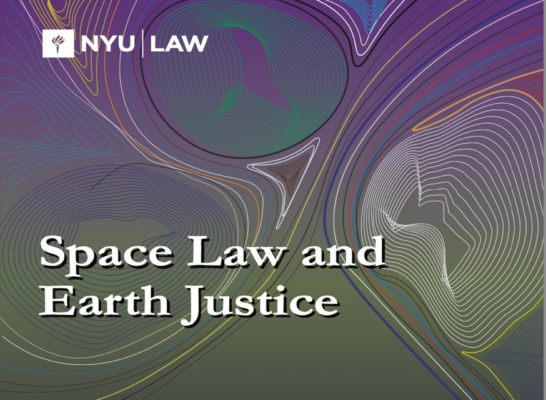Connecting with planetary legal thinking

The compounded human rights impacts of climate change need to be understood and responded to through inter-generational and planetary earth justice, drawing on children’s human rights and art-based and cultural heritage-based research co-development practices across diverse knowledge systems.
Hub Director Elisa Morgera was invited to share these reflections, as a contribution to the Space Law and Earth Justice Symposium at NYU School of Law on 20-21 March 2025. The symposium offered a dynamic interdisciplinary conversation on the evolving legal and political frameworks that shape humanity’s engagement with the Earth and outer space. Symposium participants explored pressing legal and policy issues, including deep-sea mining, geoengineering, space debris and climate justice, as well as resilience, adaptation, and reparation in the face of planetary challenges.

Elisa’s contribution drew on what she witnessed and learnt on decade-long impacts of climate change, resilience, adaptation, and loss and damage, calling attention to compounded human rights impacts, in the context of her first country visit to Vanuatu held in December 2024 in her capacity as UN Special Rapporteur on Climate Change and Human Rights.

She also drew on One Ocean Hub research on rethinking inter-generational Earth justice under international environmental law and international human rights law through the lens of children’s human rights, and specifically children’s right to development, children’s conception of time and children-centered play-based and fun-based methodologies. Also drawing on Hub research, Elisa reflected on the crucial role of diverse knowledge systems, cultural heritage and arts to support meaningful and transformative international cooperation on mitigation, adaptation, resilience and remedies at different levels, including through collaborative re-interpretations of international law in line with planetary thinking and deeper understandings of interconnections of the web of life across time and space.

Elisa also contributed to conversations on planetary thinking in the context of the implementation of the BBNJ Agreement, to advance the protection of human rights at the ocean-climate nexus; and in the context of remedies under international human rights law, notably the interaction of guarantees of non-repetition to tackle structural causes of climate change and community-led socio-ecological restoration as a form of rehabilitation.